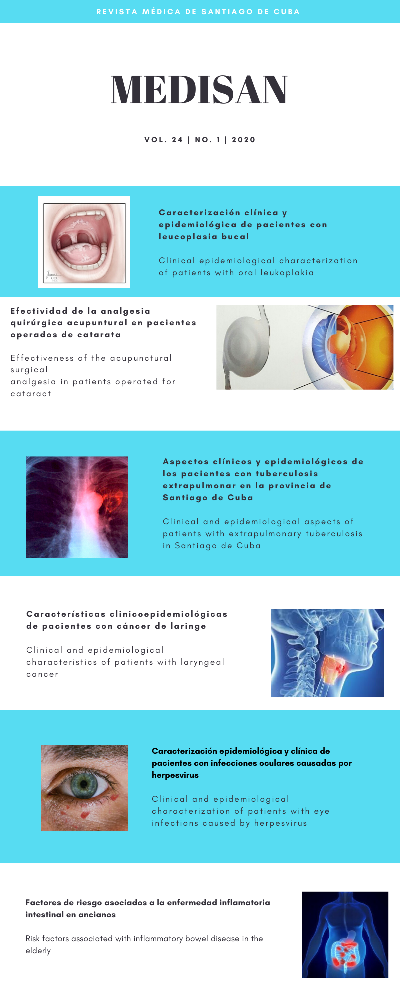Clinical epidemiological characterization of patients with oral leukoplakia
Keywords:
leucoplasia, lesión bucal, cáncer bucal, factor de riesgo.Abstract
Introduction: The oral leukoplakia is clinically presented in multiple forms. At the moment it is considered that can be homogeneous or non homogeneous.
Objective: To characterize patients with oral leukoplakia according to selected variables.
Method: A descriptive and cross-sectional study of 30 patients with leukoplakia was carried out, they were assisted in the Program of Detection of Oral Cancer service, belonging to the health area of Carlos Juan Finlay University Polyclinic in SongoLa Maya,Santiago de Cuba, during 2016. The following variables were analyzed: age, sex, skin color, risk factors, clinical forms presentation of leukoplakia, localization, number of lesions, time of nicotine addiction and malignant transformation.
Results: The 45-64 age group, male sex and persons of mixed race prevailed. The most affected anatomical localization was the residual alveolar edge. Most of those affected presented a single lesion with homogeneous clinical form, and any malignant transformation after their intervention. Nicotine addiction was the most prevalent risk factor.
Conclusions: The early detection of the oral complex lesions depends on the patient’s examination on time. An accurate diagnosis should be carried out to achieve a significant reduction of the morbidity and mortality and to increase cure and survival.
Downloads
References
2. Rivero Pérez O, Albornoz López del Castillo CM, de Jesús Nápoles I. Estudio epidemiológico y clinicopatológico de la leucoplasia oral. Revista Electrónica Dr. Zoilo E. Marinello Vidaurreta. 2014 [citado 05/05/2016]; 39 (7). Disponible en: http://revzoilomarinello.sld.cu/index.php/zmv/article/view/170
3. Carrera Torres A. Viabilidad de la toma de biopsia mediante cureta de tejido blando para el estudio de lesiones clínicamente compatibles con leucoplasia oral [tesis doctoral]. Sevilla: Universidad de Sevilla; 2015 [citado 05/05/2016]. Disponible en: https://idus.us.es/xmlui/bitstream/handle/11441/39185/Tesis%20Antonio%20Carrera%20Torres.pdf?sequence=1&isAllowed=y
4. Medina Márquez M, Carmona Lorduy M, Álvarez Villadiego P, Díaz Caballero A. Leucoplasia asociada al hábito de fumar invertido. Presentación de un caso clínico. Avances en odontoestomatología. 2015 [citado 05/05/2016]; 31 (4). Disponible en: http://scielo.isciii.es/pdf/odonto/v31n4/original2.pdf
5. Valentín González F, Rodríguez González GM, Conde Suárez HF, Vila Morales D. Intervención educativa sobre el programa de detección del cáncer bucal en estomatólogos generales. Rev. Med. Electrón. 2017 [citado 14/11/2019]; 39 (2): 259-68. Disponible en: http://scielo.sld.cu/scielo.php?script=sci_arttext&pid=S1684-18242017000200011&lng=es
6. Mesa Gómez RA, Díaz Hernández MJ, Aragón Abreu JE, Machado Ramos S, Castañeda Molerio R, Díaz Martí DM. Evaluación de la aplicación del VIMANG® en el tratamiento de la leucoplasia bucal homogénea. MEDICIEGO. 2016 [citado 14/11/2019]; 22 (4). Disponible en: https://www.medigraphic.com/pdfs/mediciego/mdc-2016/mdc164d.pdf
7. Guerra Cobián O, Sarracent Pérez H, Urbizo Vélez J. Lesiones blancas de la cavidad bucal. Concordancia diagnóstica. Rev haban cienc méd. 2014 [citado 14/11/ 2019]; 13 (5): 690-700. Disponible en: http://scielo.sld.cu/scielo.php?script=sci_arttext&pid=S1729-519X2014000500006&lng=es
8. Marín Páez W, Veiga Loyola L, Reyes Revilla Y, Mesa González DL. Lesiones bucales en adultos mayores y factores de riesgo. Policlínico "Dr. Tomás Romay", La Habana, Cuba. Rev haban cienc méd. 2017 [citado 14/11/2019]; 16 (5): 770-83. Disponible en: http://scielo.sld.cu/scielo.php?script=sci_arttext&pid=S1729-519X2017000500010&lng=es
9. Marsán Suárez V, Valcárcel Llerandi J, Macías Abraham C, Sánchez Segura M, Insua Arregui C, Del Valle Pérez L, et al. Leucoplasia oral en un paciente pediátrico con deficiencia primaria de linfocitos T. Rev. Cubana Hematol Inmunol Hemoter. 2010 [citado 05/05/2016]; 26 (1): 62-9. Disponible en: http://scielo.sld.cu/scielo.php?script=sci_arttext&pid=S0864-02892010000100007
10. Miguel Cruz PA, Niño Peña A, Batista Marrero K, Miguel-Soca PE. Factores de riesgo de cáncer bucal. Rev Cubana Estomatol. 2016 [citado 14/11/2019]; 53 (3): 128-45. Disponible en: http://scielo.sld.cu/scielo.php?script=sci_arttext&pid=S0034-75072016000300006&lng=es
11. Zamora Ugalde MJ. Atlas de patología del complejo bucal. 2017 [citado 14/11/2019]. Disponible en: https://kupdf.net/download/atlas-de-patologia-del-complejo-bucal_59f34e89e2b6f53778378d4f_pdf
12. Sosa M, Mojáiber A, Barciela MC, García M, Rojo M, Morgado DE, et al. Programa Nacional de Atención Estomatológica Integral a la población. La Habana: MINSAP; 2013.
13. Pérez Torres L, Díaz Rojas P, Conde Mengana S, Rivero Manresa Y, Bello Díaz EA. Parámetros morfométricos de la mucosa en pacientes portadores de leucoplasia bucal con displasia epitelial. AMC. 2013 [citado 05/05/2016]; 17 (4): 468-78. Disponible en: http://scielo.sld.cu/scielo.php?script=sci_arttext&pid=S1025-02552013000400005
14. Araya C. Diagnóstico precoz y prevención en cáncer de cavidad oral. Rev Méd. Clínica Las Condes. 2018 [citado 05/05/2017]; 29 (4): 411-8. Disponible en: https://www.elsevier.es/es-revista-revista-medica-clinica-las-condes-202-articulo-diagnostico-precoz-prevencion-cancer-cavidad-S0716864018300890
15. Suñé A. Desórdenes potencialmente malignos de cavidad oral. Ciudad de La Plata: Universidad Nacional de La Plata. 2014 [citado 05/05/2017]. Disponible en: https://studylib.es/doc/5332161/des%C3%B3rdenes-potencialmente-malignos-de-cavidad-oral
Verificar referencia 16
16. Estrada Pereira GA, Mestre Cabello JR, Díaz Fernández JM. Incidencia de la leucoplasia bucal en pacientes fumadores. 2015 [citado 05/05/2017]. Disponible en: https://scholar.google.com/scholar?q=related:MD7nHGLSygQJ:scholar.google.com/&scioq=leucoplasia+%2B+tabaco+&hl=es&as_sdt=0,5
Published
How to Cite
Issue
Section
License
All the articles can be downloaded or read for free. The journal does not charge any amount of money to the authors for the reception, edition or the publication of the articles, making the whole process completely free. Medisan has no embargo period and it is published under the license of Creative Commons, International Non Commercial Recognition 4.0, which authorizes the copy, reproduction and the total or partial distribution of the articles in any format or platform, with the conditions of citing the source of information and not to be used for profitable purposes.





